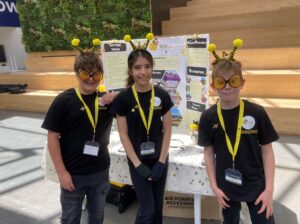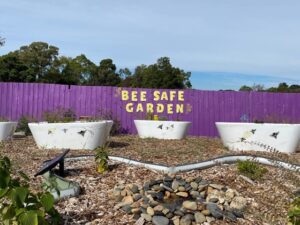
Busy Bees 
Trish Carr, Rotary Club Box Hill Burwood and Glenys Grant
The Bee Education and Protection Project (BEAP) at Parkmore Primary School aims to support the survival of native bees.
Parkmore’s Team BEAP have found concerning information that indicates native bees are endangered. If the bee population continues to decline, this could have a dramatic impact on human food production, as well as the global environment.
Team BEAP’s endeavours have included running a Native Bee Hotel competition with the finished product on display in the garden; producing a native bee memory card game and publishing a picture story book on how to protect the native bee in the garden at home. The students have also researched and published brochures on how to protect the native bee, including the use of chemical-free pesticides and weedkillers.
Partnerships and community support
To date, BEAP have successfully implemented partnerships as part of the project. These include with Beechworth Honey, who have put QR codes on their honey jars taking people to the education centre and Monash University, who is gathering data in the Native Bee-Safe Garden designed and built at the school. The garden has seen the introduction of the Blue Banded bee, Native honey bee, Reed bee and red Legged Cuckoo Bee to its precinct on a daily basis.
Gaining community support from Bunnings, Nunawading Community gardens, Richard Welsh, Whitehorse Council, students, staff, parents and friends of Parkmore primary, the details of the student’s project were also presented to the State Environmental Minister and local MP John Mullahy, who is supporting their work.
Rotary Community Grants
The BEAP project is one of the worthy recipients of Rotary Box Hill Burwood’s 2025 Annual Grants. The students and principal shared information about their exciting environmental project at the recent Rotary Community Grants Presentation Night.
This dedicated team of youngsters travelled to the international 2025 Future Problem Solving Conference Championships at Indiana University, Bloomington to present a video on their excellent environmental work. Here they competed against teams from 14 countries who presented projects and shared how they have solved problems in their community.
Box Hill Burwood Rotary received over 20 applications from local Whitehorse organisations for their 2025 Community Grants. Many worthy applicants made it very difficult for the committee to select recipients. Parkmore Primary School’s Bee Education and Protection Project (BEAP), along with the others chosen, received grants of up to $3,000 for their projects.
These yearly community grants celebrate the meaningful partnerships between Rotary and the wider community in driving positive change and supporting those in need.
Local Schools Shine as Sustainability Finalists
Sustainability Victoria
Three local schools, Box Hill High School, Camberwell Grammar School and Kew High School have been named as finalists in the 2025 ResourceSmart Schools Awards.
Box Hill High School has been nominated as a finalist in the Emerging School of the Year category, while Camberwell Grammar School is vying for the title of Campus Infrastructure & Operations School of the Year and Kew High School is hoping to win two gongs; Student Action Team of the Year (Secondary and Teacher of the Year (Secondary).
Box Hill High School’s journey began in 2022 with the establishment of a sustainability club, which has grown from four members to more than 25. The school community has worked together to implement composting, container recycling, and a recycled stationery station. They have also delivered annual events like Sustainability Week, beeswax wrap making, and Walk/Ride2School Day. The school has also worked with Monash University students on a car idling research project to reduce emissions around the school.
Camberwell Grammar School boosted the sustainability of its cafeteria by reducing landfill waste, improving recycling, and ensuring ethical purchasing. Students, staff, suppliers and parents worked together on key initiatives such as eliminating single-use plastics, using reusable bowls and cutlery, and implementing Food and Garden Organics (FOGO) bins. Student-led campaigns promoting sustainability behaviours complemented these operational improvements. The school has improved waste sorting and reduced contamination, with annual audits revealing a reduction in landfill emissions and improved recycling rates.
Kew High School has established The Kew Eco Crew, comprising students in Years 9 to 12 working together to make their school more resource efficient. The group implemented an organic waste system using worm towers, and diverted drink containers from landfill through the Container Deposit Scheme (CDS Vic), driving school-wide participation through posters, speeches and social media.
Kew High School’s Teacher of the Year nominee, Elise Dunstan, has led the way in environmental education, integrating sustainability into school operations and curriculum. Elise’s efforts include working with international students and students with additional needs, driving CDS Vic collections and promoting worm farming, recycling, and waste management. She prepares students for careers in sustainability by empowering them through events like the Kew High School Sustainability Summit, which attracted over 200 students and featured various industry and community organisations.
ResourceSmart celebrates sustainability action in schools
There are 31 schools vying for an award in Victoria’s largest celebration for primary and secondary school students, teachers and school volunteers taking sustainability action. This year, Sustainability Victoria is marking 16 years of the ResourceSmart Schools Awards with the theme, ‘Working Together’.
Katie Pahlow, Director Regions & Community Action, Sustainability Victoria, says, “We can achieve so much more when we work together, whether that’s with other students, other schools, other teachers, or the wider community beyond the school gate. By working together, our efforts combine to build the future we need.”
ResourceSmart Schools is a free Victorian Government program delivering sustainability education to help Victorian schools minimise waste, save energy and water, promote biodiversity and act on climate change. Since 2008, ResourceSmart Schools has reached over 1,600 Victorian schools. Together they have planted more than 5.1 million trees, saved over $63 million through energy, waste and water savings, diverted 170,000 cubic metres of waste from landfill and avoided over 110,000 tonnes of greenhouse gas emissions.
This year’s winners will be announced at a prestigious awards ceremony held at the MCG on 5 June. The 2025 ResourceSmart Schools Awards would not be possible without the generous support of sponsors, CDS Vic, Bank First and the Department of Education.
For information about this year’s finalists, please visit www.sustainability.vic.gov.au/2025-rssa-finalists
Marshmead – an exercise in sustainability
Ivy Sheng
Ivy Sheng is a Year 9 student at MLC. Here she describes the journey she went through in her thinking while at Marshmead, the school’s remote residential campus in East Gippsland’s Croajingolong National Park.
Two weeks ago, I climbed onto a bus at the creak of dawn, clutching a novel, pillow and journal, my heart tight in my throat and palms damp from nerves. Three Year 9 classes were setting off to Marshmead for a two-month sustainability program.
Excitement mingled with worry. This was a once-in-a-lifetime opportunity, a chance to forge closer friendships and to be part of a sustainable community that uses a circular system to recycle resources. However, two months was the longest I’d been away from home.
End of first week
After days of gruelling repetition interspersed with encouragement, I finally managed to ride a bike for the first time. I’m beyond proud of the mindset with which I approached this and other tasks. I saw each not ‘tasks’ to conquer, but opportunities for growth and challenge.
Innate human instinct seems that we gravitate towards the trees, the grass and the tranquillity of the cool breeze. The natural world puts things into perspective; particularly so for the climate crisis – at once so extensive and seemingly imponderable, rendering all else essentially trivial.
A meditation
For me, the Marshmead experience resembles a daily morning meditation where irrelevant thoughts are allowed simply ‘drift off in the breeze’, freeing me to think more deeply and clearly. By allowing me to let go of the unimportant, Marshmead constantly reminded me of what is vital; emphasising the most crucial values and making me aware of the immediate consequences of every choice, for the environment and the community.
While resting one night, I came to realise we humans hold so much power and influence; the young more so. But as we age, the routine of life so quickly gets in the way. We really have everything we need. And we can learn so much from each other’s diverse communities: how to live more sustainably, and how better to serve others. I think it’s in our nature to be somewhat ‘self-regarding’ – we can’t take that part of humanity away. But what we CAN do, is expand the part of us that feels empathy and compassion, and try to live by that, to hold it at the forefront of our minds.
The importance of love
I believe that without love we cannot fight for or protect anyone or anything. However, I think love can be learned through observation and by talking to those who have lived experience – people whose lives have been impacted, people at the frontline of the big battles such as climate change, and people just like me. Students, activists, social workers, doctors, lawyers, the young and the elderly and everyone in between. We all have a role to play, and with love we can work to achieve our goals.
Just as physical activity at Marshmead is not a chore but a culture, this is more than a place, but a mission. The physical environment here perpetuates this mission, with the transition from diesel generators to solar and battery, for example, accompanying the students on their own missions of self-discovery!
Post Marshmead reflections
Ivy Sheng
In the March 2024 edition of Eastsider News Ivy Sheng, Year 9 student at Methodist Ladies College wrote about her feelings as she headed off to spend several weeks at Marshmead, the school’s regional campus bordering the Croajingolong National Park in far East Gippsland. Here, back in Melbourne, Ivy reflects on the experience.
Life in the suburbs was all I knew – not just a setting but a background to nearly all my significant childhood memories. But at Marshmead, my dreams of work in environmental policy were forged into something I now felt was attainable.
The sudden abundance of natural space and wildlife at Marshmead after years of suburban life felt like it was encroaching upon my carefully constructed set of rigid values – the pent-up stringency I’ve come to embrace as my ‘comfort zone’. In nature, the weather can’t be directed, only predicted. The environment cannot bend to my will – unable to provide the scaffolding that I was confident would allow me to step up into the idealized world of my aspirations. The roles were reversed – nature reigned. Marshmead was a river I had to cross, and I was at the mercy of factors outside of my control.
Upon return, the paradigms have shifted… as they say. Small things I’ve picked up during this time: crumbs of the books I’ve devoured, slivers of inspiration from the documentaries we’ve watched, insights of life I’ve gained enroute; things I’ve noticed with my eyes and ears, have all taught me invaluable lessons. Nature follows its own system; it forces you to let go of your shallow ego and pay attention to something much, much bigger than yourself.
I now know, for example, that love isn’t necessarily an innate concept – in order to fight for or protect anything, you must first learn to love it. Marshmead has done for me something immeasurably valuable. It has solidified my love for the natural world, shown me the devastating effects of our consumerist system on the planet, and compelled me to step up, not only for nature, but for humanity.
I’m truly thankful to all the dedicated Marshmead staff for this transformative experience. I’ve cherished the natural wonders, and plan to pursue these interests back at home.
Postscript: Ivy learned to ride a bike at Marshmead and has started a bike riding club with friends around the Kew area. The ink drawing below was created by Ivy.

Top Image by Gerd Altmann from Pixabay




